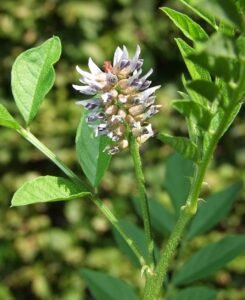Licorice Supports Adrenal and Hormonal Health

Licorice (Glycrrhiza glabra) is a rhizome used for thousands of years in herbal medicine. Licorice supports adrenal and hormonal health. It also reduces symptoms of the common cold and stomach ulcers, and potentiates other herbs. It’s an adaptogen, meaning it promotes a healthy stress response and corrects imbalances in the body. Its Greek name glykos (“sweet”) rhiza (“root”) relates to its major active component, glycyrrhizin, a triterpene saponin fifty times sweeter than sugar. Its powerful anti-inflammatory, harmonizing effect is the work of over 20 triterpenes and 300 flavonoids.
Adrenals and Stress Response
How does Licorice support a healthy stress response? The hypothalamic-pituitary-adrenal axis (HPA) is the main stress response system – the link between perceived stress and physiological reactions to stress. Saponins in licorice promote neurogenesis and protect the HPA axis from acute and long-term stress. Also, saponins restore tone to monoaminergic neurotransmitters, which transmit serotonin, dopamine, norepinephrine, epinephrine, and histamine. These might be the primary neural basis for emotional health. The adrenals make cortisol, your main stress hormone, which is responsible for:
- Boosting energy to respond to stress, and balancing afterward
- Lowering inflammation
- Regulating blood pressure
- Increasing blood sugar
- Controlling sleeping/waking
- Managing use of carbohydrates, proteins, and fats
Low cortisol can cause symptoms like fatigue, muscle weakness, low blood pressure, and loss of appetite. Glycrrhizin acts directly on the adrenal cortex and increases blood corticoids in patents with suppressed pituitary adrenocorticotropin. In other words, it restores normal cortisol metabolism when adrenal insufficiency causes low cortisol levels. Licorice will not elevate cortisol if it’s already at a healthy level.
Hormonal Health
Flavonoids in licorice account for the herb’s hormone modulatory actions, which are estrogenic or anti-androgen, depending on the target issue. Licorice mildly increases estrogen levels when they are low, as often occurs during menopause. It can reduce symptoms of low estrogen like hot flashes, mood changes, and vaginal dryness more effectively than hormone replacement therapy (HRT). Licorice can also alleviate symptoms of elevated androgens in conditions like polycystic ovarian syndrome.
Common Cold
Licorice acts as a demulcent, and is a famous remedy for a sore throat. Its polysaccharides soothe and coat mucus membranes by forming a protective film. Saponins give licorice expectorant powers that thin and loosen mucus in the airway, making coughs more productive. Flavonoids like isoliquiritigenin lessen lung inflammation.
Stomach Lining
Gastroesophageal Reflux Disease (GERD) can cause heartburn. Licorice soothes heartburn by increasing mucus production, which forms a barrier to acid in the stomach and esophagus. This also makes it an effective remedy for peptic ulcers. Peptic ulcers are painful sores that develop on the inside lining of the stomach and upper portion of the small intestine, usually caused by the bacterium Helicobacter pylori (H. pylori) and long-term use of non-steroidal anti-inflammatory drugs (NSAIDs) like ibuprofen and naproxen sodium.
History
Licorice is a flowering member of the bean family. Its roots are soft and flexible, and grow to a little over three feet long and half an inch wide. Their bright yellow inner color reveals high levels of flavonoids. Herbalists dry and powder the roots, or boil them into a thick juice to make candy. Licorice is one of the world’s oldest remedies. Traditional Chinese, Greek, and Middle Eastern medicine use it in an astounding number of herbal blends. It has a synergistic ability to enhance the efficacy of other herbs in a formula, and glycyrrhizin’s incredible sweetness masks the taste of more bitter herbs.
Licorice and Cinnamon
Nutratea herbalists combined equal amounts of licorice and cinnamon to create a tea that supports healthy, consistent energy levels. Licorice supports adrenal and hormonal health, while cinnamon prevents blood sugar spikes. They further complement each other because licorice cools irritated tissue while cinnamon warms the body. Pour yourself a hot, sweet cup of this licorice and cinnamon to restore normal energy levels or soothe a cold.



